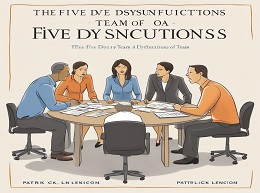The Five Dysfunctions of a Team

"The Five Dysfunctions of a Team" by Patrick Lencioni is a compelling exploration of the obstacles that hinder team effectiveness. In this review, we dissect each dysfunction and provide valuable insights into fostering a culture of trust, collaboration, and high performance within teams.
Absence of Trust:
Trust forms the foundation of any successful team. Without trust, team members are hesitant to be vulnerable, share ideas, or admit mistakes.
Example:
Google's Project Aristotle found that psychological safety feeling safe to take risks and be vulnerable within a team is crucial for high-performing teams. Teams with high psychological safety outperform others because they trust each other to support and respect their contributions.
Fear of Conflict:
Conflict, when managed constructively, can lead to better decisions and innovation. However, teams often avoid conflict to maintain artificial harmony, resulting in missed opportunities for growth.
Example:
Apple's design team, led by Steve Jobs, embraced healthy conflict during product development meetings. Team members were encouraged to challenge each other's ideas openly, leading to groundbreaking innovations such as the iPod, iPhone, and iPad.
Lack of Commitment:
Without active buy-in and commitment from team members, decisions may be second-guessed or executed half-heartedly, undermining team effectiveness.
Example:
Amazon's leadership principles, particularly "disagree and commit," emphasize the importance of collective commitment to decisions. Once a decision is made, even if individuals initially disagreed, everyone is expected to support and execute it wholeheartedly.
Avoidance of Accountability:
Teams must hold each other accountable for their actions and commitments to maintain trust and achieve shared goals.
Example:
Netflix's culture of "freedom and responsibility" promotes accountability by encouraging employees to take ownership of their work and deliver results. Peer feedback and regular performance evaluations ensure accountability at all levels of the organization.
Inattention to Results:
Ultimately, team success should be prioritized over individual achievements or departmental goals. When teams focus on collective outcomes, everyone wins.
Example:
The 2004 Boston Red Sox exemplified a results-oriented mindset by prioritizing team success over individual accolades. Despite facing significant challenges, the team rallied together and won the World Series, ending an 86-year championship drought.
"The Five Dysfunctions of a Team" offers invaluable insights into diagnosing and addressing common team challenges. By fostering trust, embracing healthy conflict, committing to decisions, holding each other accountable, and prioritizing collective results, teams can overcome dysfunctions and achieve greatness.












